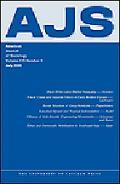
Kirk, David S.
Sociologists have given considerable attention to identifying the neighborhood-level social-interactional mechanisms that influence outcomes such as crime, educational attainment, and health. Yet, cultural mechanisms are often overlooked in quantitative studies of neighborhood effects. This paper adds a cultural dimension to neighborhood effects research by exploring the consequences of legal cynicism. Legal cynicism refers to a cultural frame in which people perceive the law as illegitimate, unresponsive, and ill equipped to ensure public safety. The authors find that legal cynicism explains why homicide persisted in certain Chicago neighborhoods during the 1990s despite declines in poverty and declines in violence city-wide.